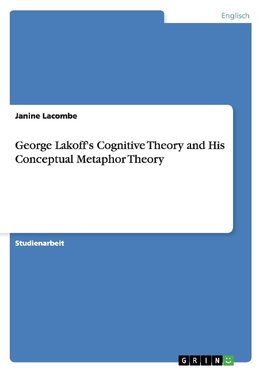
-
 Nemecký jazyk
Nemecký jazyk
George Lakoff's Cognitive Theory and His Conceptual Metaphor Theory
Autor: Janine Lacombe
Studienarbeit aus dem Jahr 2012 im Fachbereich Anglistik - Linguistik, Note: 1,3, Universität Koblenz-Landau (Anglistik), Veranstaltung: Cognitive Linguistics, Sprache: Deutsch, Abstract: Language in general has always been an intricate matter for investigation... Viac o knihe
Na objednávku, dodanie 2-4 týždne
16.65 €
bežná cena: 18.50 €
O knihe
Studienarbeit aus dem Jahr 2012 im Fachbereich Anglistik - Linguistik, Note: 1,3, Universität Koblenz-Landau (Anglistik), Veranstaltung: Cognitive Linguistics, Sprache: Deutsch, Abstract: Language in general has always been an intricate matter for investigation and scientific research. Linguistics as a field of studies particularly dedicated to the task of exploring the language faculty and its features is divided into several subcategories caused most likely by the interactive nature this field of study presents. The presented paper will focus on the field of cognitive linguistics, thereby addressing and summarizing the main concepts and theories as well as demarcating such from generative approaches. Since the subject of cognitive linguistics proves to be extremely complex and extensive, the lion's share of this work will concentrate on the cognitive theory (1987) and the corresponding theory of metaphor by George LAKOFF (1980).
In the 1980s cognitive linguistics developed mainly in the United States as a new approach to the study of language and mind and how both entities are interrelated. According to cognitive linguist Gilles FAUCONNIER, "perhaps for the first time a genuine science of meaning construction and its dynamics has been launched" (Fauconnier 96). Language is considered to be one of the most significant and fundamental features constituting human cognition, even though it may be described as only the "tip of a spectacular cognitive iceberg" (ibid.), which consists of numerous "layers" of mental processes and internal structures, enabling us to function in our experienced world. The process of generating those internal structures is believed to be conceptually motivated and initiated by perceptual salience (cf. Glynn 89), implying that the "patterns of usage represent speakers' knowledge of their language, including the conceptual structures that motivate language" (ibid.). Therefore, central to the concerns of cognitive linguistics is the idea of cognitive models, which are assumed to structure thought. The term is used mostly to express the notion that cognitive representations are stored in form of knowledge bases. Cognitive models are presumably involved in the process of reasoning and used for the development of categories (cf. Ungerer/Schmid 47, Geeraerts 2). When looking at the enormous interdisciplinary orientation cognitive linguistics and cognitive science in general employ, the complexity of attempting to analyze human cognition becomes apparent.
- Vydavateľstvo: GRIN Verlag
- Rok vydania: 2014
- Formát: Paperback
- Rozmer: 210 x 148 mm
- Jazyk: Nemecký jazyk
- ISBN: 9783656569855



 Anglický jazyk
Anglický jazyk 

 Ruský jazyk
Ruský jazyk 




